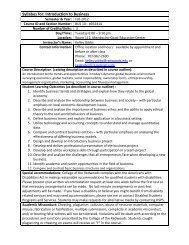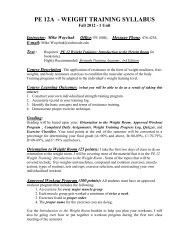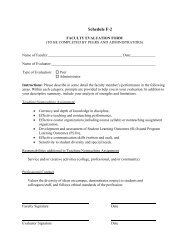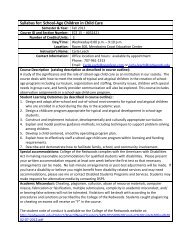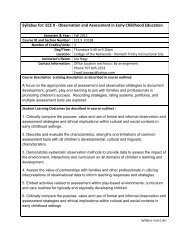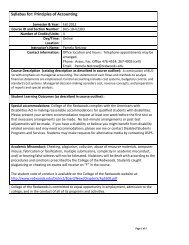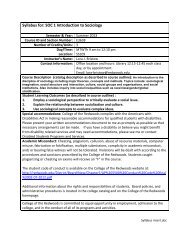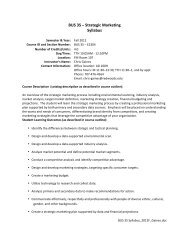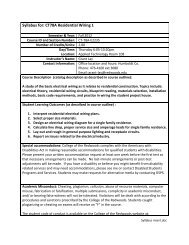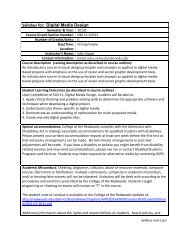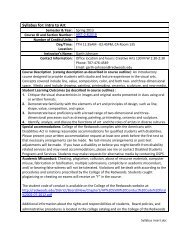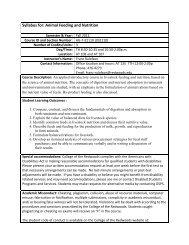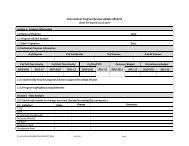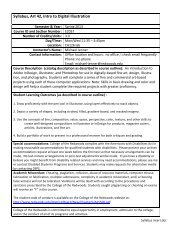Syllabus for: Cultural Anthropology - College of the Redwoods
Syllabus for: Cultural Anthropology - College of the Redwoods
Syllabus for: Cultural Anthropology - College of the Redwoods
Create successful ePaper yourself
Turn your PDF publications into a flip-book with our unique Google optimized e-Paper software.
<strong>Cultural</strong> <strong>Anthropology</strong>Anth 3 (032451) – Fall 2012 – Monday/Tuesday/Wednesday 8:15 – 9:20 at FBHSCourse website: http:// mycr.redwoods.edu/xsl-portalInstructor: Tobias Green; Office: #304; Phone: 962-2682; Email tgreen@mcn.orgOffice Hours: Monday and Wednesday 11:30-12:55 and 1:30-2:30, and by appointmentCourse Description:This course is an introduction that <strong>of</strong>fers students an understanding <strong>of</strong> human culture across space and time.Students study <strong>the</strong> <strong>the</strong>ory and history <strong>of</strong> <strong>the</strong> field, and explore ways to understand <strong>the</strong> belief systems andworldviews <strong>of</strong> o<strong>the</strong>r peoples by exploring particular cultures. They will compare and contrast those cultures in <strong>the</strong>specific contexts in which <strong>the</strong>y exist. Ethnographic readings include a study <strong>of</strong> <strong>the</strong> Beng people <strong>of</strong> western Africa,<strong>the</strong> biography <strong>of</strong> a Pomo woman from nor<strong>the</strong>rn Cali<strong>for</strong>nia, and various exemplars from <strong>the</strong> Kottak textbook.Videos provide visual and aural descriptions <strong>of</strong> a variety <strong>of</strong> cultures. The dynamic nature <strong>of</strong> culture is examinedthrough <strong>the</strong> investigation <strong>of</strong> syncretism and globalization.Objectives:Students will gain an understanding <strong>of</strong>: 1) <strong>the</strong> culture concept; 2) <strong>the</strong> diversity <strong>of</strong> human cultures, bothcontemporary and past; 3) <strong>the</strong> value <strong>of</strong> anthropological perspectives in today’s world.Student Learning Outcomes:1) Explain <strong>the</strong> relationship <strong>of</strong> cultural anthropology to o<strong>the</strong>r subdisciplines <strong>of</strong> anthropology and related biologicaland social sciences.2) Define major concepts in cultural anthropology.3) Analyze and defend viewpoints on controversial anthropological concepts, including how <strong>the</strong>se concepts mightapply to real-world situations.Texts:James Peoples & Garrick Bailey, Humanity: An Introduction to <strong>Cultural</strong> <strong>Anthropology</strong>, 9 th ed. (Wadsworth, 2011)ISBN: 978-1-111-301521Alma Gottlieb & Philip Graham, Parallel Worlds: An Anthropologist and a Writer Encounter Africa (Chicago:University <strong>of</strong> Chicago, 1993) ISBN: 0-226-30506-6Greg Sarris, Mabel McKay: Weaving <strong>the</strong> Dream (Berkeley: University <strong>of</strong> Cali<strong>for</strong>nia Press, 1994) ISBN: 0-520-20968-0Occasional readings, access from websiteClass Format:Students will take <strong>the</strong> Weekly Quiz online be<strong>for</strong>e <strong>the</strong> first class on Monday morning. Monday’s class will begin witha discussion <strong>of</strong> <strong>the</strong> readings and a syn<strong>the</strong>sis with <strong>the</strong> materials from <strong>the</strong> previous week’s class. The remainder <strong>of</strong><strong>the</strong> week’s classes will consist <strong>of</strong> a topical lecture which focuses on a crucial topic <strong>of</strong> <strong>the</strong> period under study, avisual presentation (video, slides, physical evidence, etc.), and/or a class exercise. The order <strong>of</strong> <strong>the</strong>se will varydepending on <strong>the</strong> material at hand.Grading:Weekly quizzes (10%): This brief online quiz includes factual material from <strong>the</strong> reading or a brief syn<strong>the</strong>sis <strong>of</strong> readingand lecture material. The best twelve <strong>of</strong> <strong>the</strong>se will comprise 10% <strong>of</strong> <strong>the</strong> final grade.Response Papers (20%): There will be several short response papers allowing students to reflect on <strong>the</strong>irunderstanding <strong>of</strong> culture and cultural interaction as <strong>the</strong> semester progresses.Projects (40 %): There will be two projects required <strong>for</strong> this class; see below under Projects <strong>for</strong> details. They willeach comprise 20% <strong>of</strong> <strong>the</strong> final grade.Examination (20%): There will be one Final examination, which will include two short answers and one essay. Thisexamination will comprise 20% <strong>of</strong> <strong>the</strong> final grade.Participation (10%): Regular attendance and participation in classroom discussion will be 10% <strong>of</strong> <strong>the</strong> final grade.



